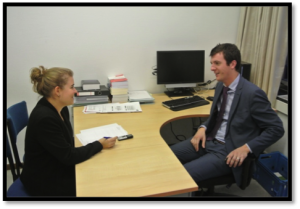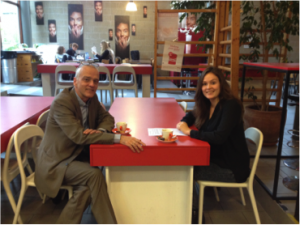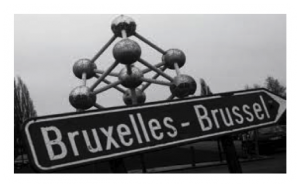De dubbelaspectleer toegelicht
- Posted on April 9, 2015
- /Under Analysis
- /With 0 Comments
See English version below.
 Professor Jürgen Vanpraet (UA) werd uitgenodigd in de Grondige Studie Grondwettelijk Recht (UGent) voor een gastcollege over de dubbelaspectleer. Studente Evelien Verstraeten heeft hem nog een aantal vragen voorgelegd, die hebben geleid tot een bijzonder interessant interview.
Professor Jürgen Vanpraet (UA) werd uitgenodigd in de Grondige Studie Grondwettelijk Recht (UGent) voor een gastcollege over de dubbelaspectleer. Studente Evelien Verstraeten heeft hem nog een aantal vragen voorgelegd, die hebben geleid tot een bijzonder interessant interview.
Jürgen Vanpraet is professor aan de Universiteit van Antwerpen en gespecialiseerd in publiekrecht. Hij beschikt over een uitgebreide expertise op het vlak van staatshervorming en de bevoegdheidsverdeling tussen de federale overheid, de gemeenschappen en gewesten. Hij is auteur van het naslagwerk ‘De latente staatshervorming’ (2011).
Shedding light on the double aspect doctrine
- Posted on April 9, 2015
- /Under Analysis
- /With 0 Comments
 Professor Jürgen Vanpraet (UA) was invited to give a guest lecture about the double aspect doctrine in the Advanced Study of Constitutional Law at Ghent University. Afterwards, student Evelien Verstraeten has asked him some additional questions, which have led to an interesting interview.
Professor Jürgen Vanpraet (UA) was invited to give a guest lecture about the double aspect doctrine in the Advanced Study of Constitutional Law at Ghent University. Afterwards, student Evelien Verstraeten has asked him some additional questions, which have led to an interesting interview.
Jürgen Vanpraet is a professor at the University of Antwerp in public law. He has a broad knowledge in the field of institutional reform and the distribution of powers between the federal level, the communities and regions. He is author of the monograph ‘De latente staatshervorming’ [The latent state reform] (2011).
Judges de-escalate heated Belgian language conflict
- Posted on March 30, 2015
- /Under Analysis
- /With 0 Comments
Stefan Graziadei, PhD student at the Faculty of Law, University of Antwerp.
With its decisions on the language facilities and the appointment of mayors in the Brussels periphery, Belgium’s highest administrative court, the Council of State, found a compromise on a very heated institutional conflict. The decisions date from June and December 2014 and are familiar to the Belgian public opinion. Unfortunately, they are largely unknown to comparative lawyers and political scientists who do not live in Belgium. The decisions deal with the Flemish government’s refusal to appoint several French-speaking mayors in the municipalities around Brussels due to breaches of the language legislation. This is a long-standing issue and was already criticized by the Council of Europe in 2008. Mayors of Dutch municipalities with facilities for French-speaking citizens refused to apply the Flemish interpretation of the language legislation, according to which French speakers have to submit a separate request for every document which they want to obtain in their own language. French speakers, on the contrary, argued that the Flemish interpretation contradicted federal law and the Belgian Constitution. In an interesting landmark decision, the Council of State cut the Gordian knot by ruling that French speakers (only) have to apply every four years in order to receive administrative documents in their language. However, the significance of this case is broader, as it touches on the delicate equilibrium between the language communities in Belgium. Political parties are often unwilling to compromise on institutional questions for strategic reasons. The decisions of the Council of State show how judges can resolve an ensuing political gridlock through imposing a mutually acceptable legal solution.
Filip, laatste Koning der Belgen? Rol en toekomst van de monarchie
- Posted on March 17, 2015
- /Under Analysis
- /With 3 Comments
 Professor Herman Van Goethem (UA) werd uitgenodigd in de Grondige Studie Grondwettelijk Recht (UGent) voor een gastcollege over de rol van de monarchie. Studente Karen van Esbroeck heeft hem nog een aantal vragen voorgelegd, die Prof. Van Goethem vrank en vrij heeft beantwoord met interessante en soms opmerkelijke antwoorden.
Professor Herman Van Goethem (UA) werd uitgenodigd in de Grondige Studie Grondwettelijk Recht (UGent) voor een gastcollege over de rol van de monarchie. Studente Karen van Esbroeck heeft hem nog een aantal vragen voorgelegd, die Prof. Van Goethem vrank en vrij heeft beantwoord met interessante en soms opmerkelijke antwoorden.
Herman Van Goethem is professor aan de Universiteit van Antwerpen. De Koninklijke Vlaamse Academie van België voor Wetenschappen en Kunsten heeft hem onlangs de Loopbaanprijs voor Wetenschapscommunicatie gegeven. Hij is gespecialiseerd in de politieke geschiedenis van België in de 19de en 20ste eeuw. Hij heeft o.m. in 2008 het boek “De monarchie en 'het einde van België'” gepubliceerd.
Enkele citaten:
“De monarchie is een instelling die geld kost, ‘die mensen wonen in kastelen’ … men kan niet van de ene op de andere dag de dotaties stopzetten.”
“Van Leopold I zijn er denk ik zeventien of achttien buitenechtelijke kinderen gekend. Deze kinderen kunnen geografisch gelokaliseerd worden op de weg die Leopold I moest afleggen van Brussel naar zijn kasteel in de Ardennen.”
“De rol van de Koning bij het vormen van een regering is nog de enige belangrijke rol.”
“De monarchie als instelling is niet meer van deze tijd … Bij de mensen in de straat … zal je wel een emotionele waarde waarnemen die ze aan de monarchie hechten.”
“Het is niet denkbaar en niet doenbaar om in België de monarchie af te schaffen. Enkel in de context van het uiteenvallen van België zou dit kunnen gebeuren.”
“De erfelijkheid van gestoorde familierelaties vind je ook bij de monarchie … Ik vermoed dat de zaak Delphine Boël uiteindelijk onontvankelijk kan worden verklaard, omdat die termijn al lang verstreken is, zelfs als de publieke opinie sterk zou reageren op deze onrechtvaardigheid.”
Monthly Overview – February 2015
- Posted on March 10, 2015
- /Under Monthly Overview
- /With 0 Comments
BelConLawBlog publishes a selected reading list of new scholarship regarding Belgian constitutional law in journals and books (I), decisions of the Belgian Constitutional Court in which a violation of the Constitution has been found (II), upcoming national conferences (III), news articles (IV), and call for papers (V). In order to submit relevant developments for our monthly overview, please contact us. This list was composed with cooperation of Pieter Lavens (student-assistant, UGent).
Monthly Overview – January 2015
- Posted on February 19, 2015
- /Under Monthly Overview
- /With 0 Comments
BelConLawBlog publishes a selected reading list of new scholarship regarding Belgian constitutional law in journals and books (I), decisions of the Belgian Constitutional Court in which a violation of the Constitution has been found (II), upcoming national conferences (III), news articles (IV), and call for papers (V). In order to submit relevant developments for our monthly overview, please contact us. This list was composed with cooperation of Martijn Vermeersch (student-assistant, UGent).
De toekomst van het Belgisch federalisme
- Posted on February 6, 2015
- /Under Sixth State Reform
- /With 0 Comments
See English version below.
Dubbel-interview met Prof. J. Vande Lanotte (UGent) & Prof. S. Sottiaux (KU Leuven Kulak)
Moderator Jurgen Goossens (doctoraal onderzoeker, UGent)
m.m.v. Anna Vanhellemont (masterstudent Grondige Studie Grondwettelijk Recht, UGent)
Het heeft 541 dagen geduurd om een akkoord te bereiken over de zesde staatshervorming, die momenteel volop wordt geïmplementeerd. Als afsluiter van BelConLawBlog’s overzicht van de zesde staatshervorming rijst de vraag hoe het Belgisch (con)federalisme verder dient te evolueren. In een uniek dubbelinterview trachten Johan Vande Lanotte en Stefan Sottiaux hier een antwoord op te formuleren. Johan Vande Lanotte is Minister van Staat, lid van de Kamer van Volksvertegenwoordigers, en professor Staatsrecht aan de Universiteit Gent. Hij was heel nauw betrokken bij de onderhandelingen over de meest recente staatshervormingen. In het vlugschrift ‘De Belgische Unie bestaat uit vier deelstaten’ heeft hij de krijtlijnen van een toekomstmodel voor België uitgetekend. Stefan Sottiaux is professor Grondwettelijk Recht en Administratief Recht aan KU Leuven Kulak. In zijn boek ‘De Verenigde Staten van België’ reflecteert hij over de toekomst van België en het grondwettelijk recht in de gelaagde rechtsorde. Hierna volgt een beknopte weergave van het video-interview.
The future of Belgian federalism
- Posted on February 6, 2015
- /Under Sixth State Reform
- /With 0 Comments
Double interview with Prof. J. Vande Lanotte (UGent) & Prof. S. Sottiaux (KU Leuven Kulak)
Moderator Jurgen Goossens (doctoral researcher, UGent)
With cooperation of Anna Vanhellemont (master student Advanced Study of Constitutional Law, UGent)
It has taken 541 days to reach an agreement on the sixth Belgian state reform, which is currently being implemented. In order to round off BelConLawBlog's overview of the sixth state reform, we will inquire how Belgian (con)federalism could evolve in the future. In a unique double interview, Johan Vande Lanotte and Stefan Sottiaux develop their view on this subject. Johan Vande Lanotte is Minister of State, member of the Chamber of Representatives, and professor of Constitutional Law at Ghent University. He was involved in the negotiations of the most recent state reforms. In his paper 'De Belgische Unie bestaat uit vier deelstaten' [The Belgian Union consists of four states] he has outlined a model for Belgium’s institutional future. Stefan Sottiaux is professor of Constitutional Law and Administrative Law at the KU Leuven Kulak. In his book 'De Verenigde Staten van België' [The United States of Belgium], he reflects on the future of Belgium and constitutional law in the multi-level legal order. Hereafter, a concise summary of the video-interview will be provided, through a non-literal translation.
Monthly Overview – December 2014
- Posted on January 20, 2015
- /Under Monthly Overview
- /With 0 Comments
BelConLawBlog publishes a selected reading list of new scholarship regarding Belgian constitutional law in journals and books (I), decisions of the Belgian Constitutional Court in which a violation of the Constitution has been found (II), upcoming national conferences (III), news articles (IV), and call for papers (V). In order to submit relevant developments for our monthly overview, please contact us.
The future of Brussels after the sixth state reform
- Posted on December 23, 2014
- /Under Sixth State Reform
- /With 0 Comments
See Dutch version below
Jana Huyghe and Pieter Steenhaut (master students Advanced Study of Constitutional Law, UGent), Jurgen Goossens (doctoral researcher, UGent) & Pieter Cannoot (academic assistant, UGent)
Overview sixth state reform: part 6 of 6
“After the sixth state reform, Brussels has become more than a full-fledged region. One could now call Brussels a 'super-Region' or 'Region-Community’.”
“Citizens are increasingly convinced of the idea that the inhabitants of Brussels form a group which should govern Brussels without interference from the Flemish and French Community.”
 The Brussels-Capital Region has acquired many powers in the sixth state reform. Although Flemish politicians often suggest to combine transfer of powers and additional financial means for this region with an internal institutional reform of Brussels, a simplification has again not been achieved. Brussels remains a tangle of many institutions, so that a thorough structural reform is still necessary. Theoretically, several evolutions are conceivable in the future, but how does Brussels evolve in reality?
The Brussels-Capital Region has acquired many powers in the sixth state reform. Although Flemish politicians often suggest to combine transfer of powers and additional financial means for this region with an internal institutional reform of Brussels, a simplification has again not been achieved. Brussels remains a tangle of many institutions, so that a thorough structural reform is still necessary. Theoretically, several evolutions are conceivable in the future, but how does Brussels evolve in reality?


